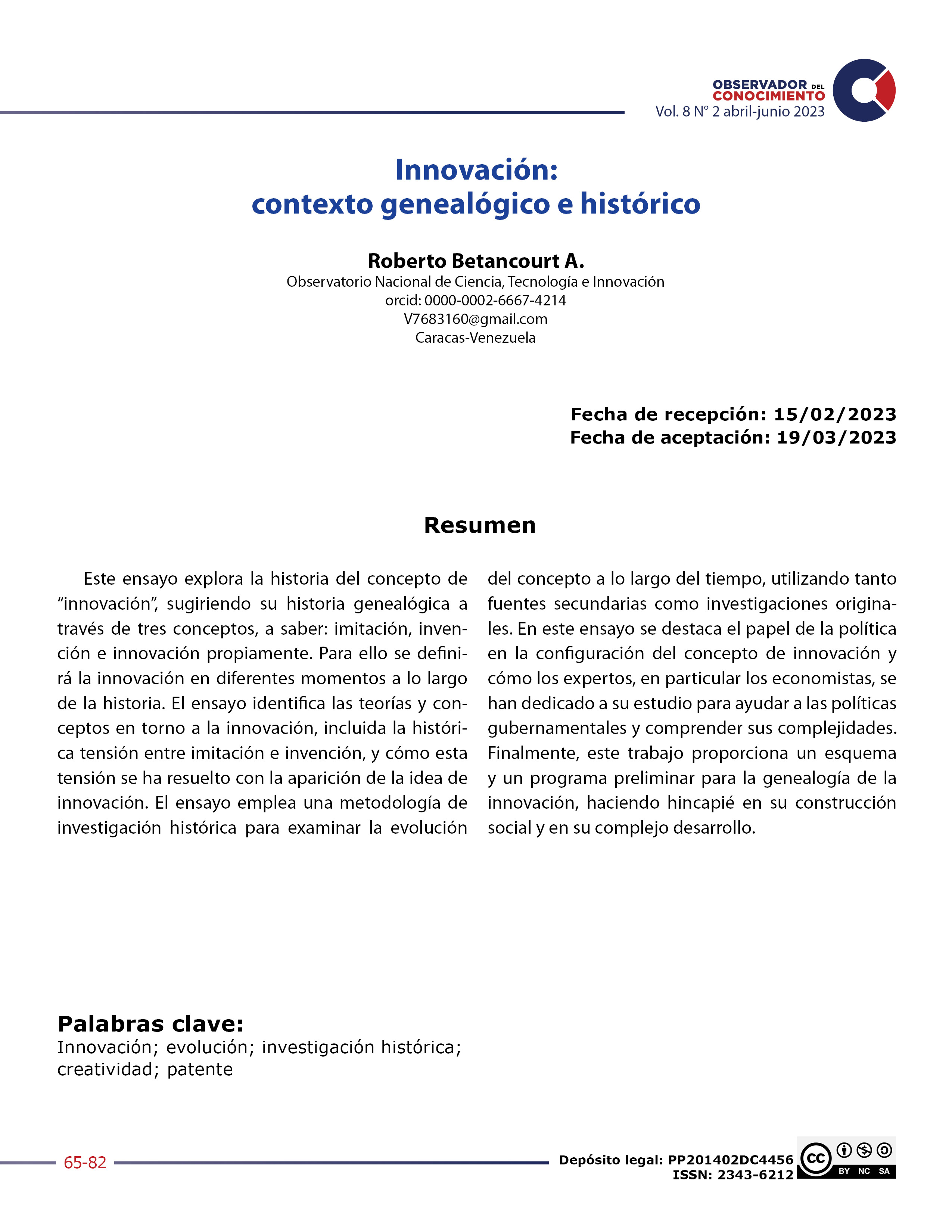Innovation: genealogical and historical context
Keywords:
Innovation, evolution, historical research, creativity, patentAbstract
This essay explores the history of the concept of "innovation" and suggests a genealogical history for it through three concepts: imitation, invention, and innovation itself, which have all defined innovation at different times throughout history. The essay identifies the theories and concepts surrounding innovation, including the tension between imitation and invention in the past, and how this tension has been resolved with the emergence of the idea of innovation. The essay employs a historical research methodology to examine the evolution of the concept over time using both secondary sources and original research. The author highlights the role of politics in shaping the concept of innovation, and how experts, particularly economists, have been engaged in its study to help government policies and understand its complexities. It, finally, asserts that this work provides a preliminary outline and program for the genealogy of innovation, emphasizing its social construction and complex development.
Downloads
References
Betancourt, R. (2022). Viendo el futuro a través de la prospectiva tecnológica. Observador del Conocimiento, 7(3), pp. 144-163.
Brundage, A. (2017). Going to the Sources: A Guide to Historical Research and Writing. Wiley-Blackwell. Sexta edición.
Capdevila, A. (2004). La retórica del objeto. Las partes retóricas como modelo para generar significados. Temes de Disseny, 21, Barcelona, pp. 54-61.
Cicerón, M. (85 a. C.). De inventione (Sobre la invención retórica). Recuperado el 23 de mayo de 2023 en: https://bit.ly/3BSsWm0
Cook, H. (2007). Matters of exchange: commerce, medicine and science in the dutch golden age. New Haven: Yale University Press.
Crymble, A. (2021). Technology and the Historian: transformations in the digital age. Illinois: University of Illinois Press.
Force, P. (2005). Innovation as spiritual exercise: Montaigne and Pascal. Journal of the history of ideas. Project Muse, 66(1), pp. 17-35. Recuperado el 20 de mayo de 2023 en: http://www.columbia.edu/~pf3/Innovation.pdf
Goldenberg, M. (2004). Social innovation in Canada: how the non-profit sector serves canadians and how it can serve them better. Canadian Policy Research Networks.
Goswami, S. y Mathew, M. (2005). Definition of innovation revisited: an empirical study on indian information technology industry. International Journal of Innovation Management, 9(3), pp. 371-383. September 2005.
Hilaire-Pérez, L. (2000). Invención técnica en el Siglo de las Luces. Paris: Albin Michel.
Hughes, T. (1983). Networks of power: electrification in western society, 1880-1930. Johns Hopkins University Press. Reprint edition.
Kuhn, T. (1962). La estructura de la revolución científica. Chicago: University of Chicago Press.
Kushner, E. (1980). The concept of invention and its role in renaissance literary theory, Neohelicon, 8(1), pp. 135-146.
Monlau, P. (1856). Diccionario Etimológico de la Lengua Castellana. Madrid: Imprenta y Estereotipía de M. Rivadeneyra.
Organización para la Cooperación y el Desarrollo Económicos (2005). Oslo manual: guidelines for collecting and interpreting innovation data. Tercera edición. París: OECD.
Palonen, K. (1997). Quentin Skinner's rhetoric of conceptual change. History of Human Sciences, 10(2), pp. 61-80.
Red Iberoamericana de Indicadores de Ciencia y Tecnología (Ricyt) y Organización de Estados Americanos (OEA) (2001). Normalización de Indicadores de Innovación Tecnológica en América Latina y el Caribe.
Schumpeter, J. (1942). El Proceso de Destrucción Creativa, en Capitalismo, Socialismo y Democracia. Nueva York: Harper.
Schumpeter, J. (1947). La respuesta creativa en la historia económica. Journal of Economic History, noviembre, pp. 149-159.
Schumpeter, J. (1939). Ciclos económicos: un análisis teórico, histórico y estadístico del proceso capitalista. Nueva York: McGraw-Hill.
Schumpeter, J. (1928). La inestabilidad del capitalismo. The Economic Journal, septiembre, pp. 361-386.
Schumpeter, J. (1912). La teoría del desarrollo económico: una investigación sobre las ganancias, el capital, el crédito, el interés y el ciclo económico. Cambridge: Harvard University Press.
Skinner, Q. (1988). Language and social change. Princeton: Princeton University Press.
Smith, P. y Findlen, P. (2002). Merchants and Marvels: Commerce, Science and Arts in Early Modern Europe”. New York: Routledge.
Tarde, G. (1890). Las leyes de la imitación. Paris: Límite, 2001.
Tarde, G. (1895). La lógica social. Le Plessis-Robinson: Instituto Synthélabo 1999.
Tarde, G. (1897). La oposición universal: ensayo de una teoría de los opuestos. Le Plessis-Robinson: Instituto Synthélabo, 1999.
Tarde, G. (1898). Leyes sociales: esbozo de una sociología. Le Plessis-Robinson: Instituto Synthélabo, 1999.
Tarde, G. (1902). La invención, motor de la evolución social. Revista Internacional de Sociología, junio, pp. 561-574.
Utterback, J. y Abernathy, J. (1975). A Dynamic Model of Process and Product Innovation. Omega, 3 (6), pp. 639-656.
Utterback, J. (1974). Innovation in Industry and the Diffusion of Technology. Science, 183 (4125), pp. 620-626.

Downloads
Published
How to Cite
Issue
Section
License

This work is licensed under a Creative Commons Attribution-NoDerivatives 4.0 International License.







